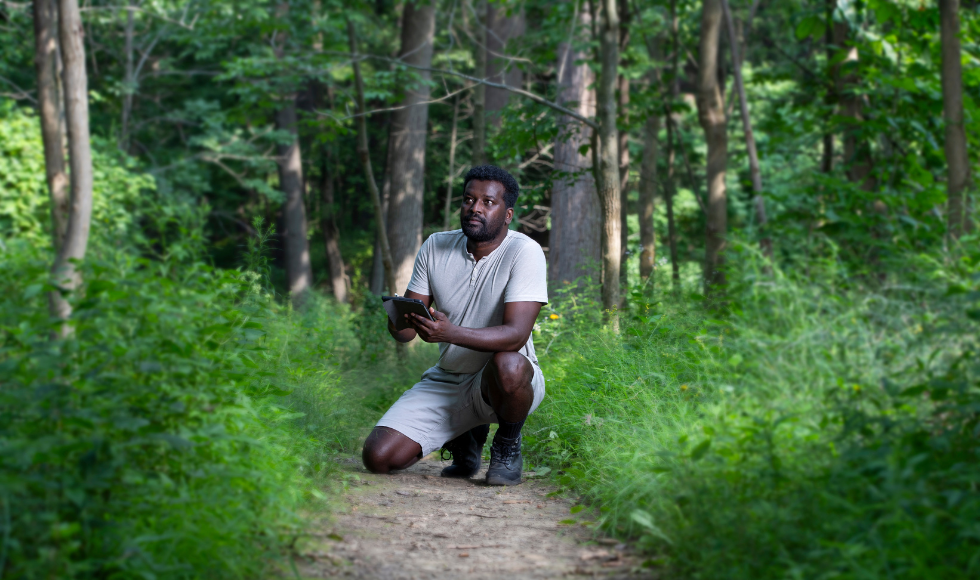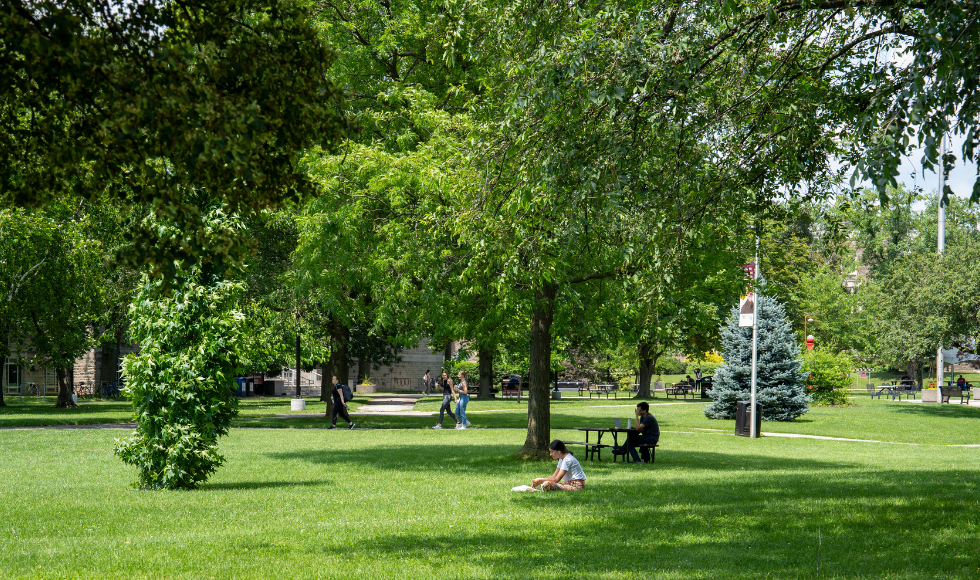
April 19, 2024
How McMaster is transforming our campus into a living laboratory for sustainability
Planting an entire forest, one tree at a time. Promoting the use of fossil-fuel-free energy sources. Teaching others how to incorporate sustainable practices into their day-to-day lives. Finding practical ways to help reverse the effects of climate change.
These are just some of the things McMaster’s students, researchers and staff are doing to improve the health of the planet, today and every day.
This Earth Day, we’re thinking about climate change and planetary health — what is happening, who it impacts and what we can do.
Here are some of the ways our community members are leading the charge for a cleaner, greener future.
Student life
 A greener, healthier way to get to campus
A greener, healthier way to get to campus
Good news for anyone hoping to travel to McMaster and its surroundings in a sustainable way: Thanks to a group of students, the revitalized Parking Services website has a new focus on sustainable and active transportation.
Science student launches project to reuse lab coats
Second-year Integrated Science student Isaac Begun has launched ReCoat with a grant from the McMaster Okanagan Office of Health & Well-being. Students finishing their last labs can now hand off their lab coats to students about to the start their first labs.
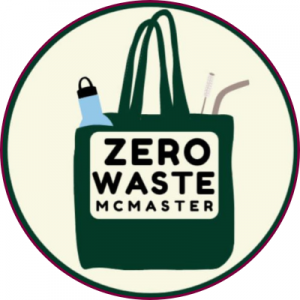 Zero Waste McMaster helps students live more sustainably
Zero Waste McMaster helps students live more sustainably
How a student group is helping others adopt small, accessible, low-waste lifestyle changes that can add up to a big difference.
Students planting trees by searching the web
A group of sustainability-focused students are encouraging the adoption of a search engine that helps fund reforestation projects.
Two student-run projects win 2023 Climate Change and Health Innovation Award
The top prizes went to students who facilitated a community tree-planting event, and a group who helped in the collection and reuse of donated technology.
Students help community members adopt sustainable habits
A group of McMaster students from SUSTAIN 3S03 helped elementary school students adopt greener modes of transportation, and created a platform for campus community members to give unwanted items a second life.
Toward a net zero carbon campus
President David Farrar talks to Director of Sustainability Dave Cano about McMaster’s plan to get to net-zero carbon emissions, the many sustainability initiatives underway across campus, and about Cano’s lifelong passion for sustainability.
Sustainability research at McMaster
 PhD student enlists citizen scientists and Stanford AI researchers to study fish in Georgian Bay
PhD student enlists citizen scientists and Stanford AI researchers to study fish in Georgian Bay
Growing up, Danielle Montocchio had gone on family camping trips around Georgian Bay. And once she learned about wetlands, it was clear what she wanted to study and protect.
 Analysis: New technologies could de-acidify the oceans – and even remove carbon dioxide in the process
Analysis: New technologies could de-acidify the oceans – and even remove carbon dioxide in the process
In the effort to combat the catastrophic impacts of global warming, new electrochemical technologies might be able help our oceans and the atmosphere, writes chemical engineering professor Charles-Francois de Lannoy.
 “This is a time and place for humanities to step out of the shadows and to shine”
“This is a time and place for humanities to step out of the shadows and to shine”
Five researchers from the Faculty of Humanities discuss the importance of Earth Day and how their work intersects with social challenges and the environment.
 Even microbes felt the impact of ancient climate transitions
Even microbes felt the impact of ancient climate transitions
Researchers at McMaster traced the impacts of ancient ecological transitions down to the microbial level, finding even bacteria and single-celled organisms changed as the climate around them shifted at the end of the last ice age.
 How health care can help save our frail planet
How health care can help save our frail planet
Myles Sergeant, an assistant clinical professor known for his climate advocacy and initiatives, talks about the dangers of climate change, the power of individuals and the health care sector to drive sustainable change, and his hope to save our “frail planet.”
Analysis: Nuclear energy would be a clean win for remote communities
As Canada and the world strive to reach net-zero emissions by 2050, greater use of nuclear power – especially small modular reactors (SMRs) and micro reactors – is key for Canada, writes McMaster president David Farrar and associate vice-president, nuclear, Dave Tucker.
 Humanities and Engineering researchers team up to address climate change impacts on Black communities
Humanities and Engineering researchers team up to address climate change impacts on Black communities
The weight of the world is not always distributed evenly, especially when it comes to the climate crisis. That’s why McMaster researchers Ingrid Waldron and Zobia Jawed lead workshops that help racialized community members recognize the ways in which climate change affects their lives, and empower them to act.
 Analysis: E-fuels can play a huge role in Canada’s journey towards a net-zero future
Analysis: E-fuels can play a huge role in Canada’s journey towards a net-zero future
Engineering researcher Keena Trowell writes that renewables and e-fuels could be instrumental in Canada’s green transition — and that the cited impediments may not be true barriers at all.
 Nanoscale research might help convert CO2 waste into usable products
Nanoscale research might help convert CO2 waste into usable products
Think of it as recycling on a nanoscale. Chemical Engineering Professor Drew Higgins and postdoctoral fellow Ahmed Abdellah used extremely powerful magnification equipment to study how synthetic materials that catalyze and convert carbon dioxide break down.
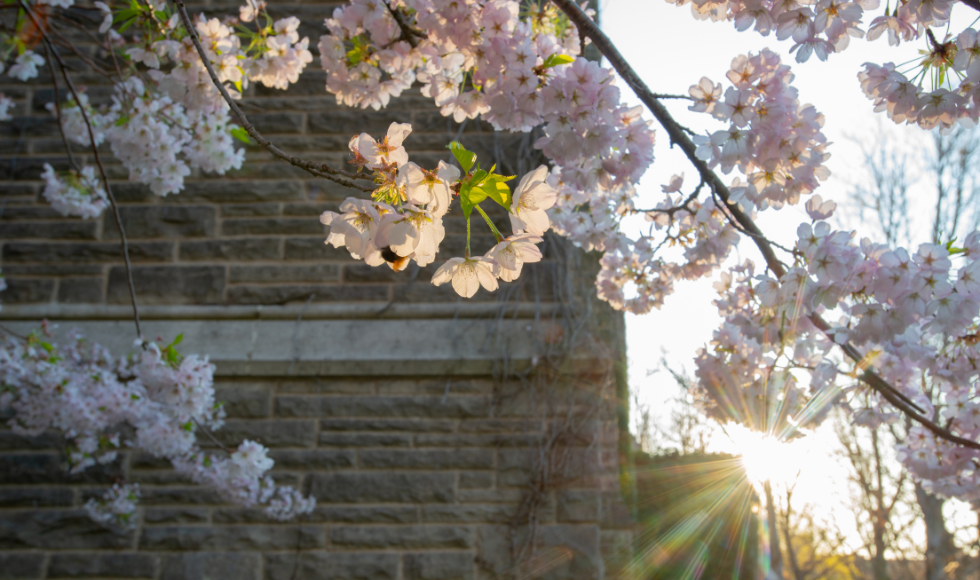
McMaster alumni
 McMaster alumni reinforce the importance of river science
McMaster alumni reinforce the importance of river science
Streams and rivers are among the most valuable lifelines on our planet. McMaster alumni and philanthropists Brad Fairley (’79) and Margaret Gadsby (’78) know the importance of advancing research that helps strengthen and steward our rivers and streams.
 Making the fashion industry more sustainable, one piece at a time
Making the fashion industry more sustainable, one piece at a time
Winnie May Chan (’15 & ‘17) shares how her time at McMaster led her to a career at the intersection of innovation and sustainability in the textile and apparel sector.
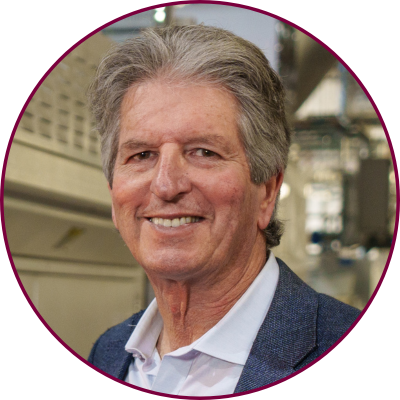 Revolutionizing the world’s energy future
Revolutionizing the world’s energy future
Martin Green (’74) has spent his career working to improve the efficiencies of solar cells. The engineer and McMaster grad shares his insights on the future of the industry.
 Finding opportunities in the search for energy solutions
Finding opportunities in the search for energy solutions
McMaster graduate Sharolyn Mathieu Vettese (’76) shares how the great North American blackout of 2003 spurred her to launch a renewable energy company and start a lifelong search for green energy solutions.
A sustainable campus
 McMaster surpasses targets for carbon reduction investments
McMaster surpasses targets for carbon reduction investments
The university has reduced the carbon intensity of its investments by 70 per cent, exceeding its original goal of 65 per cent by 2025.
 New nesting garden to help boost population of native bees
New nesting garden to help boost population of native bees
The garden was designed to accommodate the different types of environments these important pollinator species like to nest in.
 New office supply reuse program launches for McMaster faculty and staff
New office supply reuse program launches for McMaster faculty and staff
Unwanted campus office furniture is matched with new owners, giving these supplies a second life and saving them from the landfill.
McMaster continues to divest from fossil fuel investments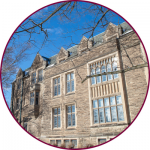
Fossil fuel companies now make up just 2.7 per cent of McMaster’s investment portfolio, down from 4.5 per cent in 2018.
New geothermal green energy system on campus
McMaster will heat its new campus greenhouse with emissions-free geothermal energy, and is exploring multiple locations on campus for future geothermal sites.
Ask a McMaster expert: Net zero carbon campus
Engineering professor Jim Cotton, an expert on sustainable energy, answers questions about McMaster’s plans to achieve net zero carbon emissions on campus.


